Environmental Analysis: Rubbish Problems in Vietnam
VerifiedAdded on 2022/12/15
|6
|1023
|295
Report
AI Summary
This report provides an analysis of the escalating rubbish problem in Vietnam, focusing on its causes, effects, and potential solutions. The report identifies the increasing amount of non-recycled waste, including plastic, beer cans, and food waste, as a major issue, highlighting the lack of proper waste collection and the environmental consequences of informal dumping sites. The effects discussed include environmental damage, health risks, and negative impacts on tourism. Proposed solutions involve expanding waste collection networks, improving landfill management, promoting recycling, and implementing policies to reduce plastic waste from industries. The report emphasizes the need for government intervention, technological advancements, and public awareness to effectively address the rubbish problem and improve waste management practices in Vietnam. It also references several studies and research papers to support its findings.
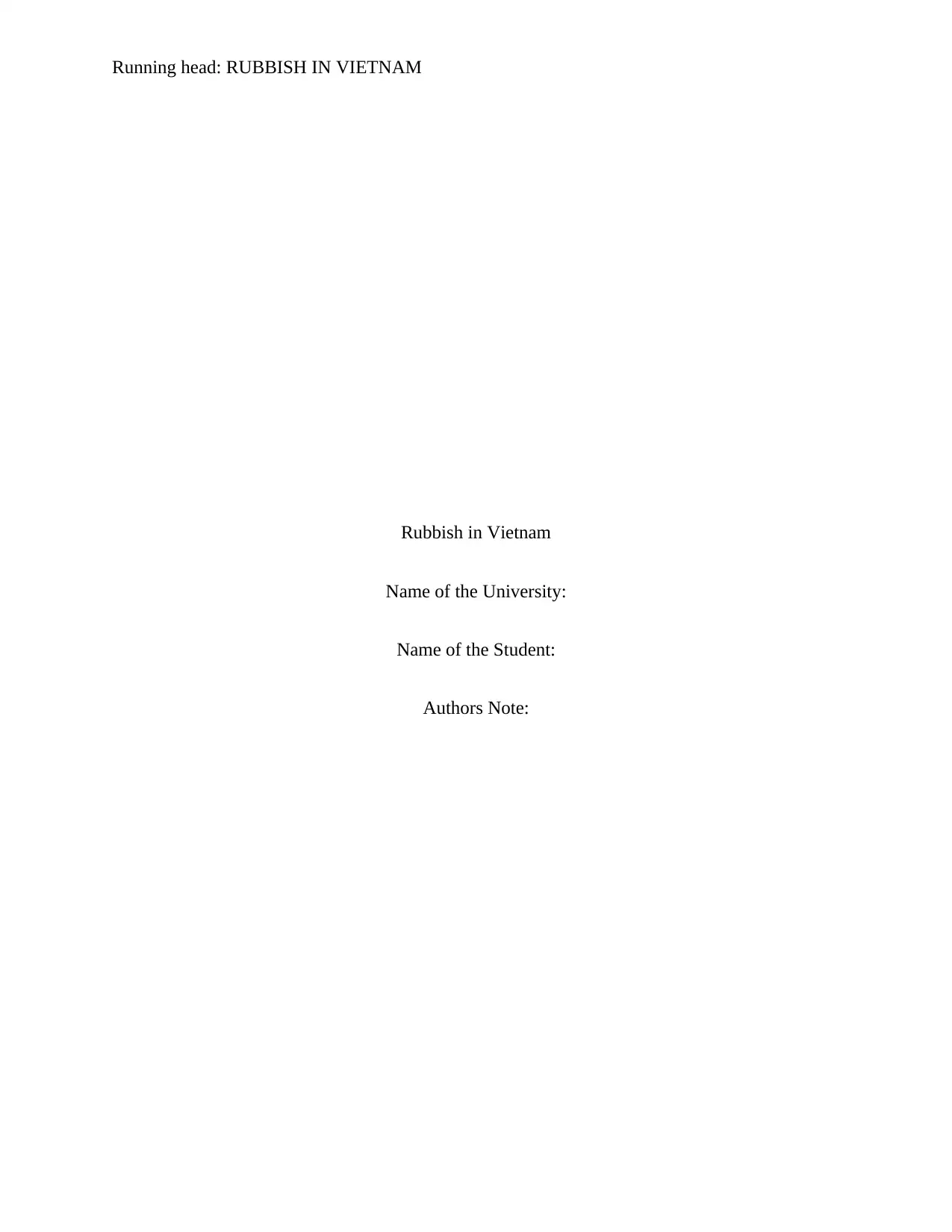
Running head: RUBBISH IN VIETNAM
Rubbish in Vietnam
Name of the University:
Name of the Student:
Authors Note:
Rubbish in Vietnam
Name of the University:
Name of the Student:
Authors Note:
Paraphrase This Document
Need a fresh take? Get an instant paraphrase of this document with our AI Paraphraser
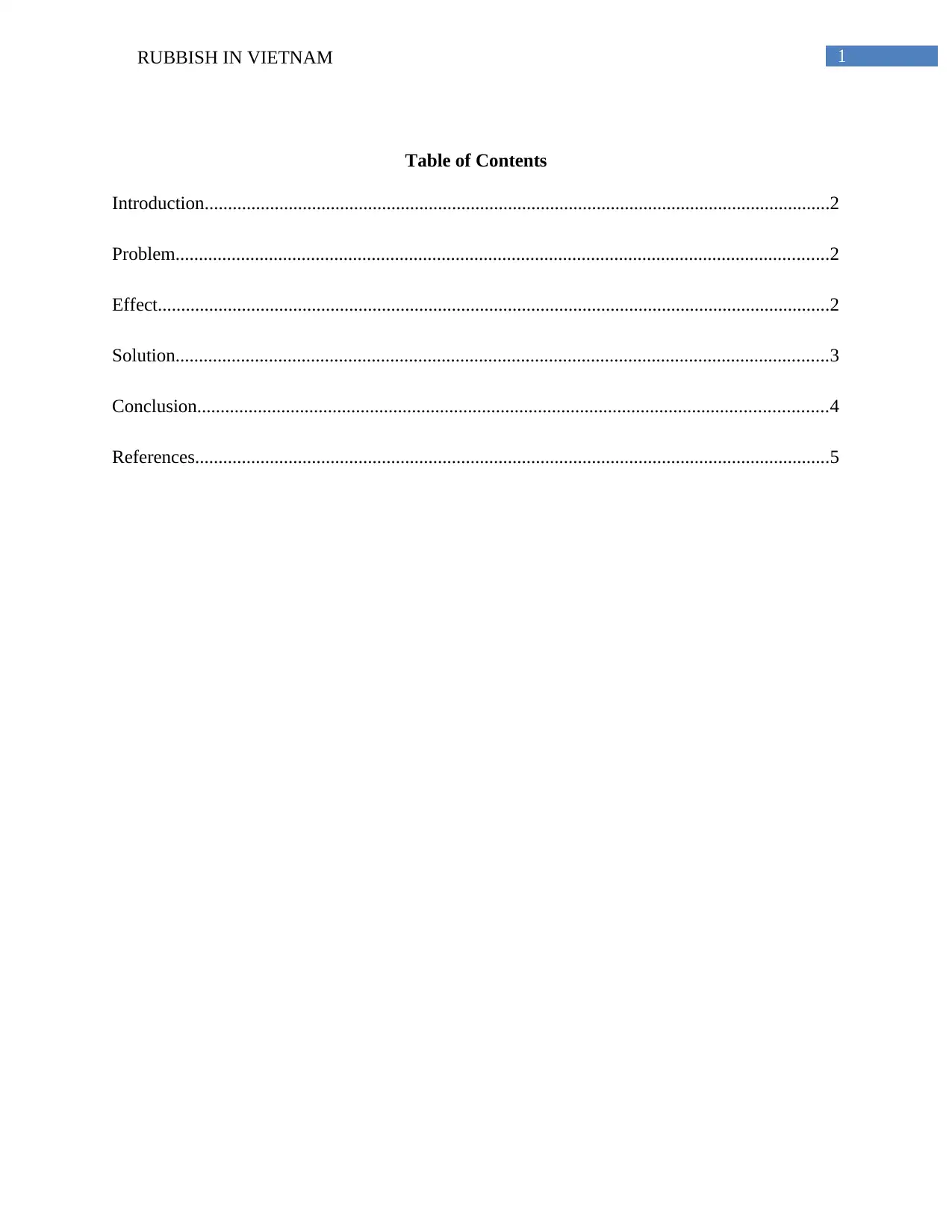
1RUBBISH IN VIETNAM
Table of Contents
Introduction......................................................................................................................................2
Problem............................................................................................................................................2
Effect................................................................................................................................................2
Solution............................................................................................................................................3
Conclusion.......................................................................................................................................4
References........................................................................................................................................5
Table of Contents
Introduction......................................................................................................................................2
Problem............................................................................................................................................2
Effect................................................................................................................................................2
Solution............................................................................................................................................3
Conclusion.......................................................................................................................................4
References........................................................................................................................................5
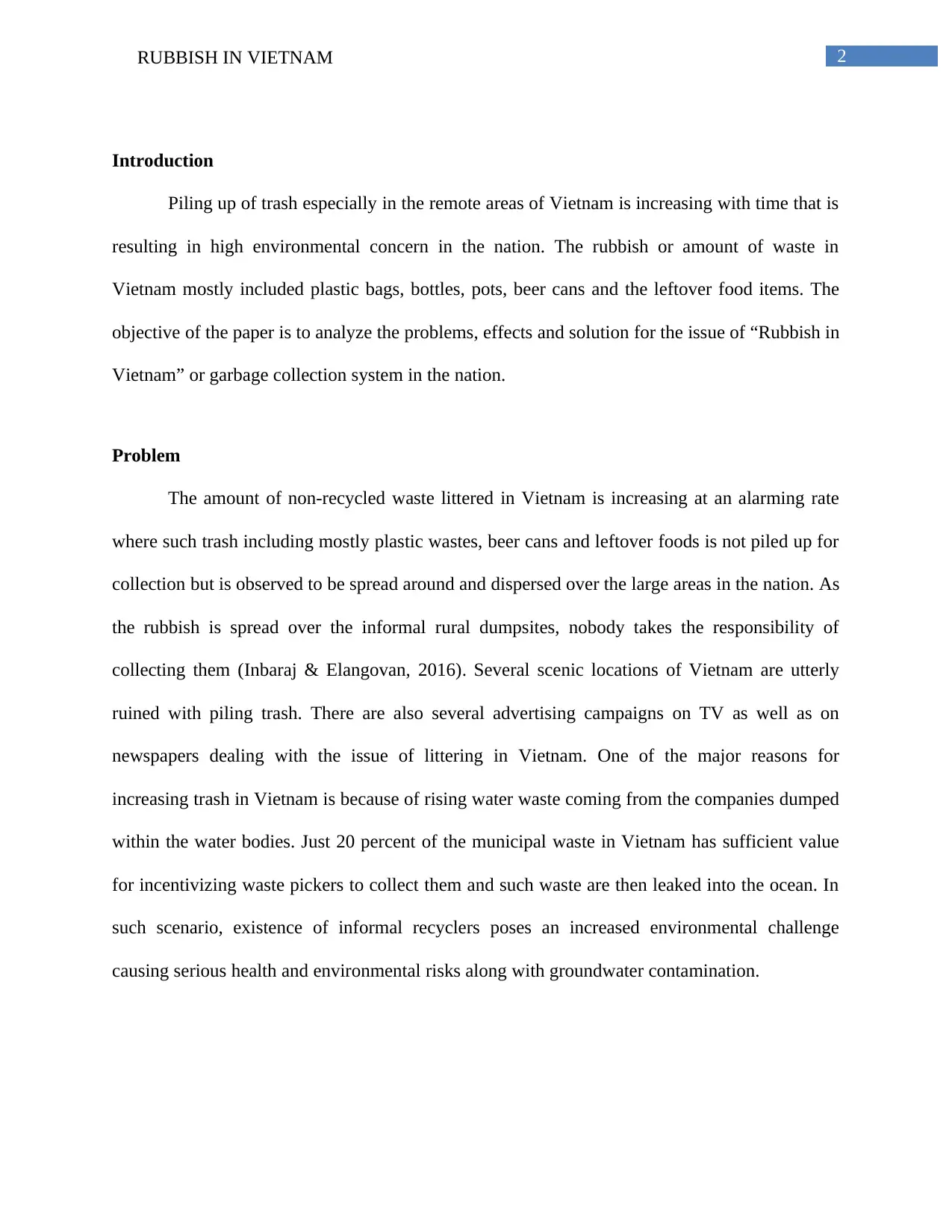
2RUBBISH IN VIETNAM
Introduction
Piling up of trash especially in the remote areas of Vietnam is increasing with time that is
resulting in high environmental concern in the nation. The rubbish or amount of waste in
Vietnam mostly included plastic bags, bottles, pots, beer cans and the leftover food items. The
objective of the paper is to analyze the problems, effects and solution for the issue of “Rubbish in
Vietnam” or garbage collection system in the nation.
Problem
The amount of non-recycled waste littered in Vietnam is increasing at an alarming rate
where such trash including mostly plastic wastes, beer cans and leftover foods is not piled up for
collection but is observed to be spread around and dispersed over the large areas in the nation. As
the rubbish is spread over the informal rural dumpsites, nobody takes the responsibility of
collecting them (Inbaraj & Elangovan, 2016). Several scenic locations of Vietnam are utterly
ruined with piling trash. There are also several advertising campaigns on TV as well as on
newspapers dealing with the issue of littering in Vietnam. One of the major reasons for
increasing trash in Vietnam is because of rising water waste coming from the companies dumped
within the water bodies. Just 20 percent of the municipal waste in Vietnam has sufficient value
for incentivizing waste pickers to collect them and such waste are then leaked into the ocean. In
such scenario, existence of informal recyclers poses an increased environmental challenge
causing serious health and environmental risks along with groundwater contamination.
Introduction
Piling up of trash especially in the remote areas of Vietnam is increasing with time that is
resulting in high environmental concern in the nation. The rubbish or amount of waste in
Vietnam mostly included plastic bags, bottles, pots, beer cans and the leftover food items. The
objective of the paper is to analyze the problems, effects and solution for the issue of “Rubbish in
Vietnam” or garbage collection system in the nation.
Problem
The amount of non-recycled waste littered in Vietnam is increasing at an alarming rate
where such trash including mostly plastic wastes, beer cans and leftover foods is not piled up for
collection but is observed to be spread around and dispersed over the large areas in the nation. As
the rubbish is spread over the informal rural dumpsites, nobody takes the responsibility of
collecting them (Inbaraj & Elangovan, 2016). Several scenic locations of Vietnam are utterly
ruined with piling trash. There are also several advertising campaigns on TV as well as on
newspapers dealing with the issue of littering in Vietnam. One of the major reasons for
increasing trash in Vietnam is because of rising water waste coming from the companies dumped
within the water bodies. Just 20 percent of the municipal waste in Vietnam has sufficient value
for incentivizing waste pickers to collect them and such waste are then leaked into the ocean. In
such scenario, existence of informal recyclers poses an increased environmental challenge
causing serious health and environmental risks along with groundwater contamination.
⊘ This is a preview!⊘
Do you want full access?
Subscribe today to unlock all pages.

Trusted by 1+ million students worldwide
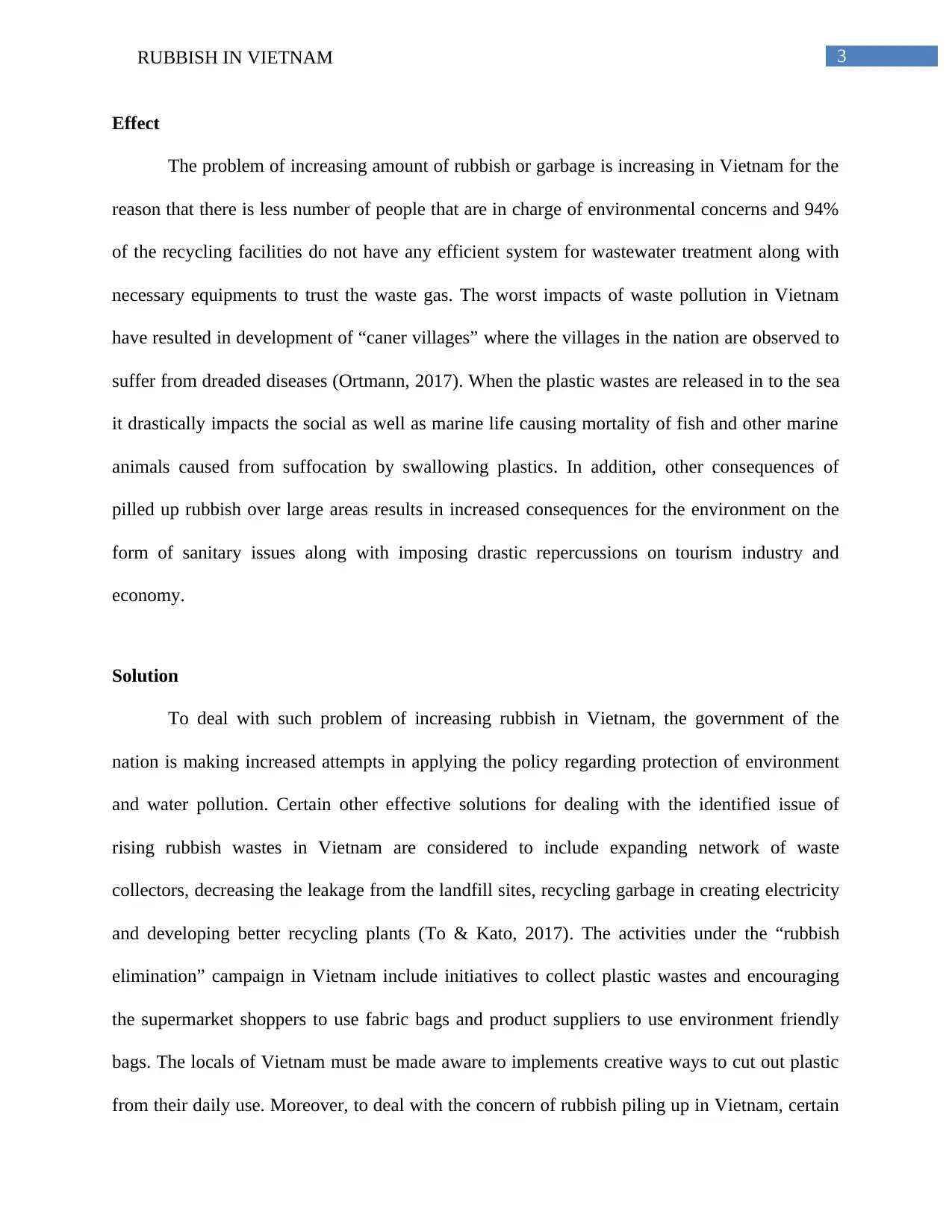
3RUBBISH IN VIETNAM
Effect
The problem of increasing amount of rubbish or garbage is increasing in Vietnam for the
reason that there is less number of people that are in charge of environmental concerns and 94%
of the recycling facilities do not have any efficient system for wastewater treatment along with
necessary equipments to trust the waste gas. The worst impacts of waste pollution in Vietnam
have resulted in development of “caner villages” where the villages in the nation are observed to
suffer from dreaded diseases (Ortmann, 2017). When the plastic wastes are released in to the sea
it drastically impacts the social as well as marine life causing mortality of fish and other marine
animals caused from suffocation by swallowing plastics. In addition, other consequences of
pilled up rubbish over large areas results in increased consequences for the environment on the
form of sanitary issues along with imposing drastic repercussions on tourism industry and
economy.
Solution
To deal with such problem of increasing rubbish in Vietnam, the government of the
nation is making increased attempts in applying the policy regarding protection of environment
and water pollution. Certain other effective solutions for dealing with the identified issue of
rising rubbish wastes in Vietnam are considered to include expanding network of waste
collectors, decreasing the leakage from the landfill sites, recycling garbage in creating electricity
and developing better recycling plants (To & Kato, 2017). The activities under the “rubbish
elimination” campaign in Vietnam include initiatives to collect plastic wastes and encouraging
the supermarket shoppers to use fabric bags and product suppliers to use environment friendly
bags. The locals of Vietnam must be made aware to implements creative ways to cut out plastic
from their daily use. Moreover, to deal with the concern of rubbish piling up in Vietnam, certain
Effect
The problem of increasing amount of rubbish or garbage is increasing in Vietnam for the
reason that there is less number of people that are in charge of environmental concerns and 94%
of the recycling facilities do not have any efficient system for wastewater treatment along with
necessary equipments to trust the waste gas. The worst impacts of waste pollution in Vietnam
have resulted in development of “caner villages” where the villages in the nation are observed to
suffer from dreaded diseases (Ortmann, 2017). When the plastic wastes are released in to the sea
it drastically impacts the social as well as marine life causing mortality of fish and other marine
animals caused from suffocation by swallowing plastics. In addition, other consequences of
pilled up rubbish over large areas results in increased consequences for the environment on the
form of sanitary issues along with imposing drastic repercussions on tourism industry and
economy.
Solution
To deal with such problem of increasing rubbish in Vietnam, the government of the
nation is making increased attempts in applying the policy regarding protection of environment
and water pollution. Certain other effective solutions for dealing with the identified issue of
rising rubbish wastes in Vietnam are considered to include expanding network of waste
collectors, decreasing the leakage from the landfill sites, recycling garbage in creating electricity
and developing better recycling plants (To & Kato, 2017). The activities under the “rubbish
elimination” campaign in Vietnam include initiatives to collect plastic wastes and encouraging
the supermarket shoppers to use fabric bags and product suppliers to use environment friendly
bags. The locals of Vietnam must be made aware to implements creative ways to cut out plastic
from their daily use. Moreover, to deal with the concern of rubbish piling up in Vietnam, certain
Paraphrase This Document
Need a fresh take? Get an instant paraphrase of this document with our AI Paraphraser
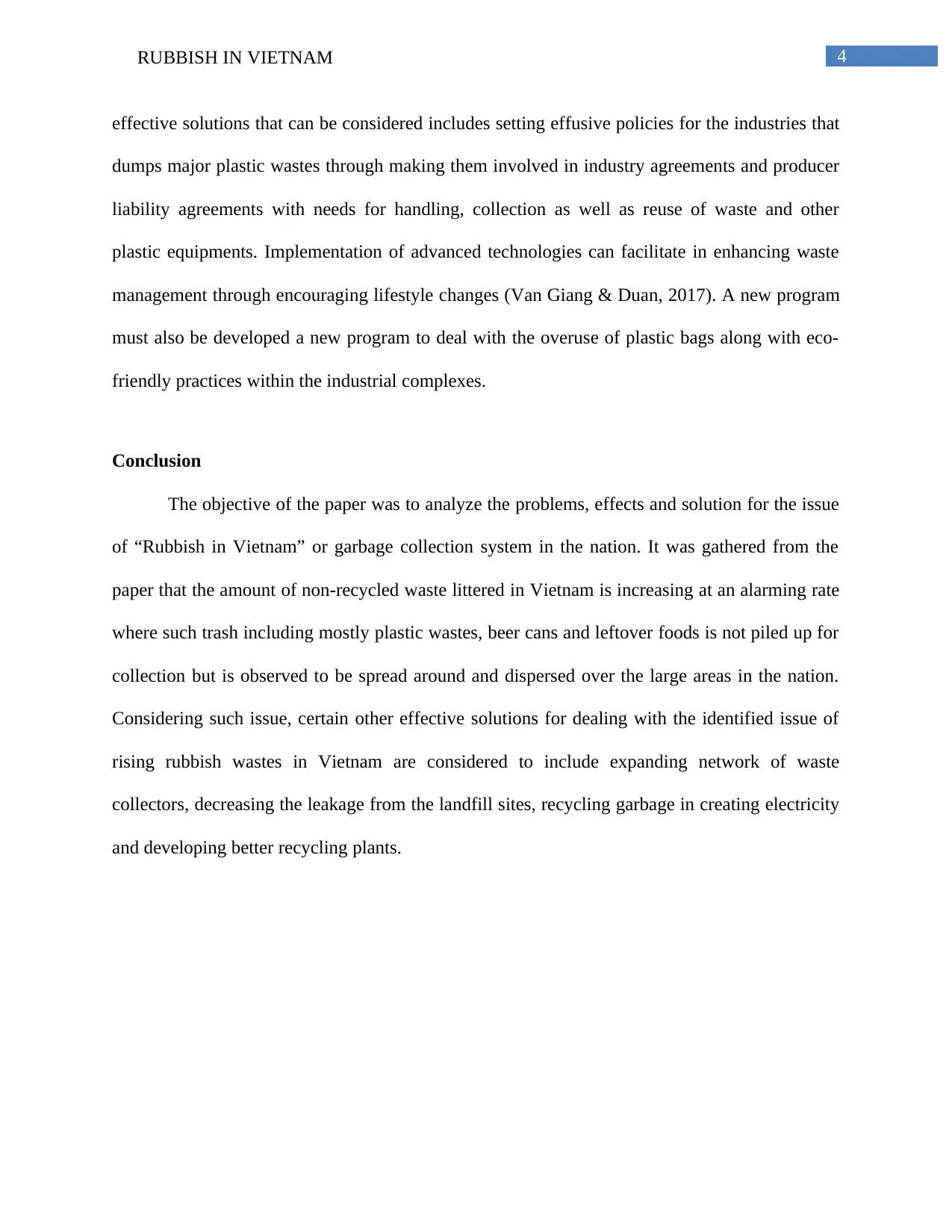
4RUBBISH IN VIETNAM
effective solutions that can be considered includes setting effusive policies for the industries that
dumps major plastic wastes through making them involved in industry agreements and producer
liability agreements with needs for handling, collection as well as reuse of waste and other
plastic equipments. Implementation of advanced technologies can facilitate in enhancing waste
management through encouraging lifestyle changes (Van Giang & Duan, 2017). A new program
must also be developed a new program to deal with the overuse of plastic bags along with eco-
friendly practices within the industrial complexes.
Conclusion
The objective of the paper was to analyze the problems, effects and solution for the issue
of “Rubbish in Vietnam” or garbage collection system in the nation. It was gathered from the
paper that the amount of non-recycled waste littered in Vietnam is increasing at an alarming rate
where such trash including mostly plastic wastes, beer cans and leftover foods is not piled up for
collection but is observed to be spread around and dispersed over the large areas in the nation.
Considering such issue, certain other effective solutions for dealing with the identified issue of
rising rubbish wastes in Vietnam are considered to include expanding network of waste
collectors, decreasing the leakage from the landfill sites, recycling garbage in creating electricity
and developing better recycling plants.
effective solutions that can be considered includes setting effusive policies for the industries that
dumps major plastic wastes through making them involved in industry agreements and producer
liability agreements with needs for handling, collection as well as reuse of waste and other
plastic equipments. Implementation of advanced technologies can facilitate in enhancing waste
management through encouraging lifestyle changes (Van Giang & Duan, 2017). A new program
must also be developed a new program to deal with the overuse of plastic bags along with eco-
friendly practices within the industrial complexes.
Conclusion
The objective of the paper was to analyze the problems, effects and solution for the issue
of “Rubbish in Vietnam” or garbage collection system in the nation. It was gathered from the
paper that the amount of non-recycled waste littered in Vietnam is increasing at an alarming rate
where such trash including mostly plastic wastes, beer cans and leftover foods is not piled up for
collection but is observed to be spread around and dispersed over the large areas in the nation.
Considering such issue, certain other effective solutions for dealing with the identified issue of
rising rubbish wastes in Vietnam are considered to include expanding network of waste
collectors, decreasing the leakage from the landfill sites, recycling garbage in creating electricity
and developing better recycling plants.
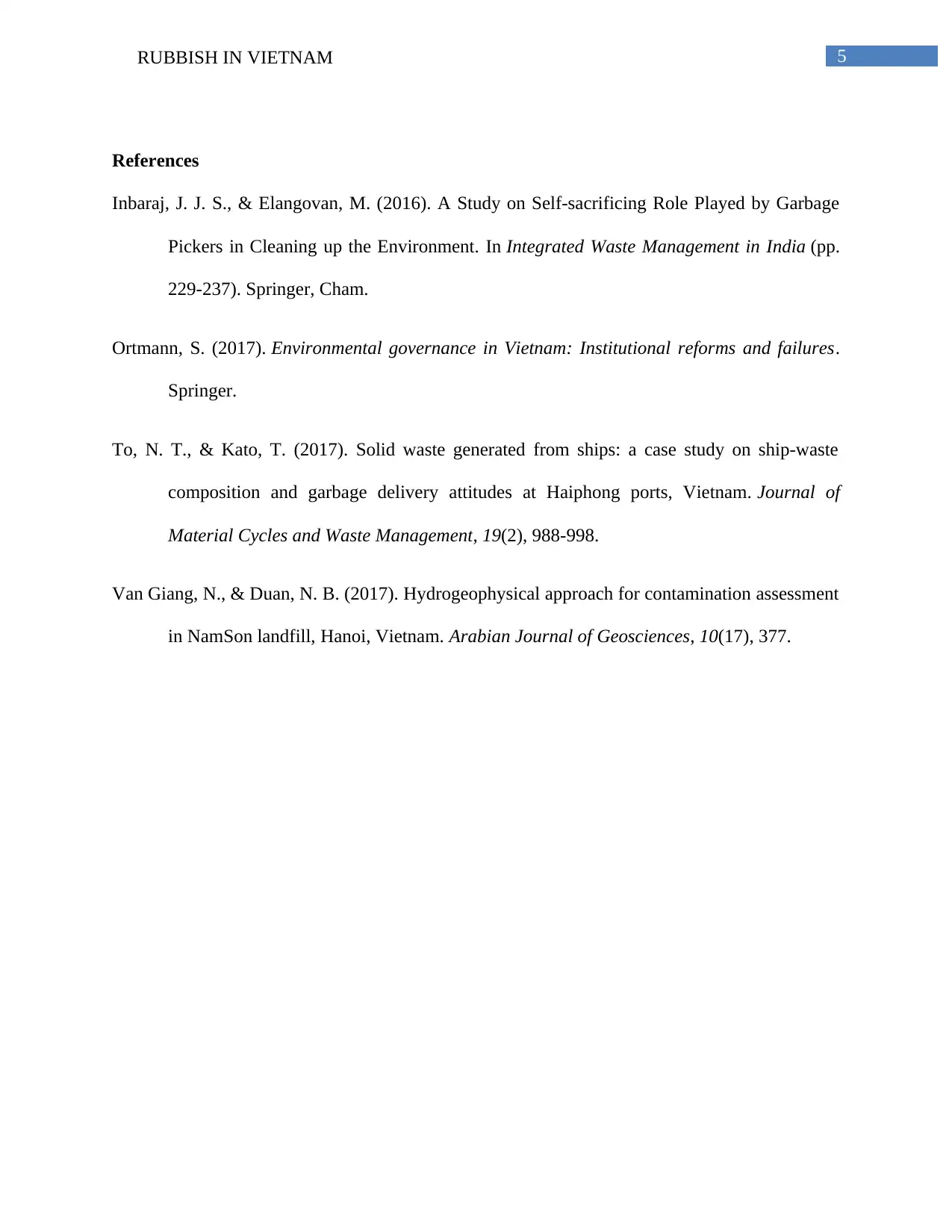
5RUBBISH IN VIETNAM
References
Inbaraj, J. J. S., & Elangovan, M. (2016). A Study on Self-sacrificing Role Played by Garbage
Pickers in Cleaning up the Environment. In Integrated Waste Management in India (pp.
229-237). Springer, Cham.
Ortmann, S. (2017). Environmental governance in Vietnam: Institutional reforms and failures.
Springer.
To, N. T., & Kato, T. (2017). Solid waste generated from ships: a case study on ship-waste
composition and garbage delivery attitudes at Haiphong ports, Vietnam. Journal of
Material Cycles and Waste Management, 19(2), 988-998.
Van Giang, N., & Duan, N. B. (2017). Hydrogeophysical approach for contamination assessment
in NamSon landfill, Hanoi, Vietnam. Arabian Journal of Geosciences, 10(17), 377.
References
Inbaraj, J. J. S., & Elangovan, M. (2016). A Study on Self-sacrificing Role Played by Garbage
Pickers in Cleaning up the Environment. In Integrated Waste Management in India (pp.
229-237). Springer, Cham.
Ortmann, S. (2017). Environmental governance in Vietnam: Institutional reforms and failures.
Springer.
To, N. T., & Kato, T. (2017). Solid waste generated from ships: a case study on ship-waste
composition and garbage delivery attitudes at Haiphong ports, Vietnam. Journal of
Material Cycles and Waste Management, 19(2), 988-998.
Van Giang, N., & Duan, N. B. (2017). Hydrogeophysical approach for contamination assessment
in NamSon landfill, Hanoi, Vietnam. Arabian Journal of Geosciences, 10(17), 377.
⊘ This is a preview!⊘
Do you want full access?
Subscribe today to unlock all pages.

Trusted by 1+ million students worldwide
1 out of 6
Related Documents
Your All-in-One AI-Powered Toolkit for Academic Success.
+13062052269
info@desklib.com
Available 24*7 on WhatsApp / Email
![[object Object]](/_next/static/media/star-bottom.7253800d.svg)
Unlock your academic potential
Copyright © 2020–2025 A2Z Services. All Rights Reserved. Developed and managed by ZUCOL.





